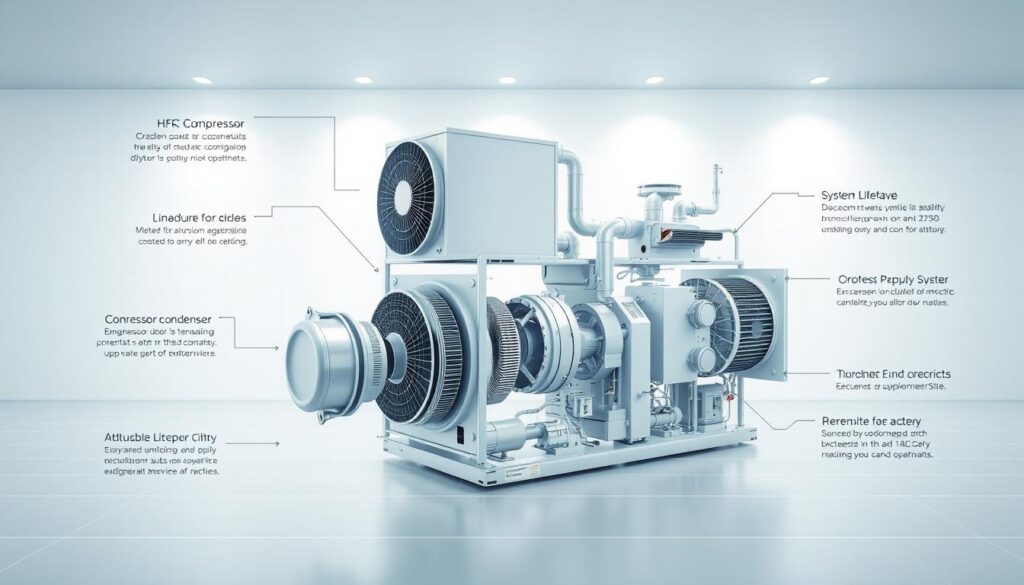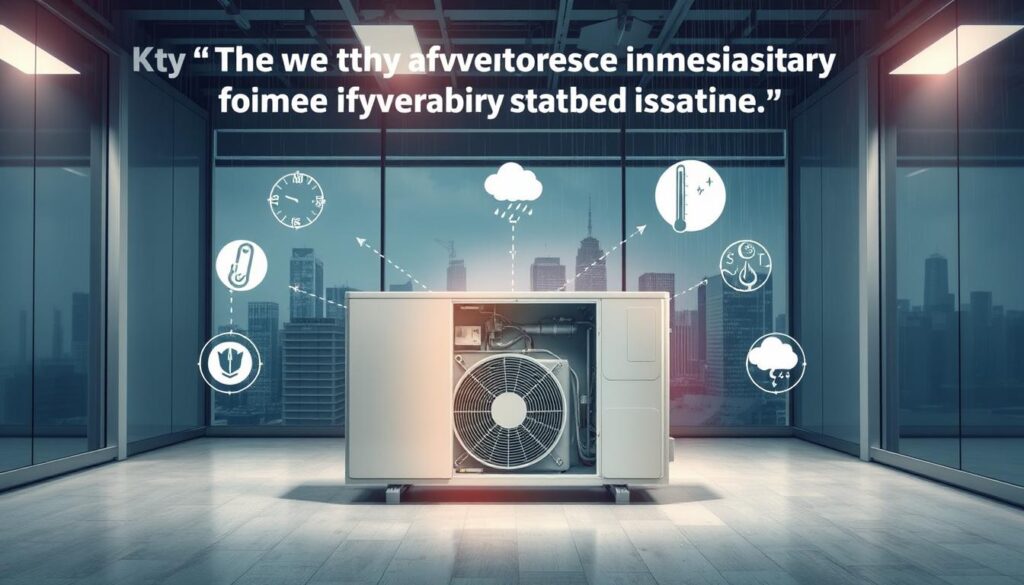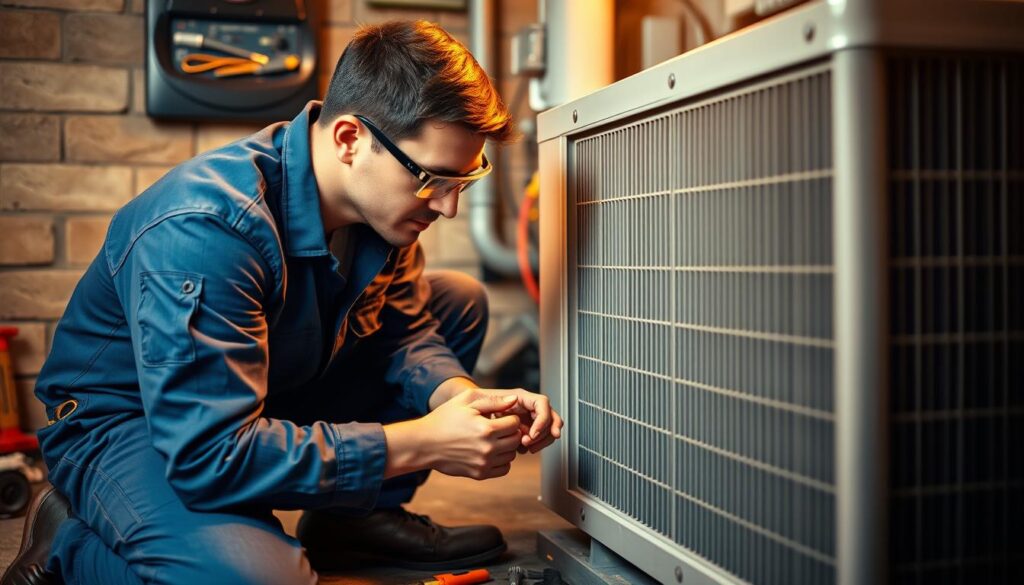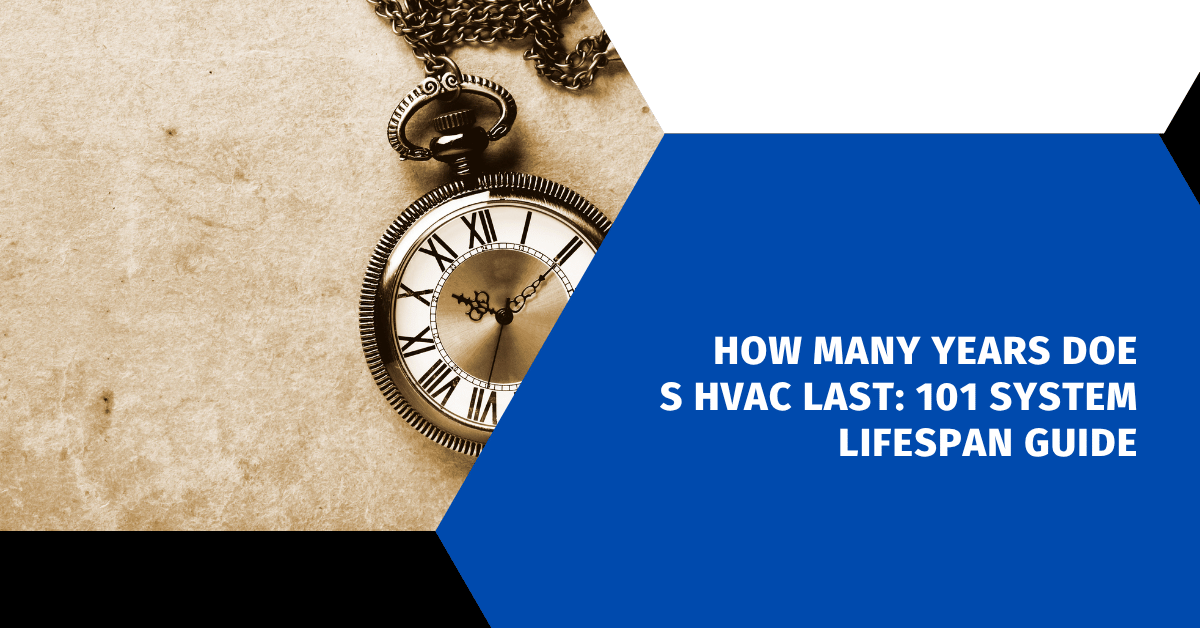Affiliate Disclosure
HVAC Guide Guys is a participant in the Amazon Services LLC Associates Program, an affiliate advertising program designed to provide a means for sites to earn advertising fees by advertising and linking to Amazon.
How Many Years Does HVAC Last? Ever thought about how long your home’s comfort system will last? It’s important to know how long your HVAC system will last. This helps you keep your home comfortable without breaking the bank.

Your heating and cooling system is a big investment. Knowing how long it will last helps you plan and budget better. It also helps you avoid sudden breakdowns that can make your home too hot or too cold.
This guide will cover everything about how long HVAC systems last. You’ll learn about typical lifespans and how to make your system last longer. We’ll talk about maintenance strategies and how they can help extend your system’s life.
Key Takeaways
- Average HVAC systems last between 10-20 years
- Regular maintenance dramatically improves system longevity
- Different HVAC components have varying lifespans
- Environmental factors significantly impact system durability
- Professional inspections can prevent premature system failure
Table of Contents
Understanding HVAC System Longevity Basics
When you buy an HVAC system, knowing how long it will last is key. The lifespan of your HVAC unit depends on many things. These things affect how well it works and how long it lasts. Knowing how long you might need to replace it helps you plan for the future.
Different HVAC systems last for different times. This depends on their design, how often you use them, and how well you take care of them. Let’s look at what affects how long your system might last.
Different Types of HVAC Systems and Their Lifespans
HVAC systems vary in design and lifespan. Here are some examples:
- Central Air Conditioning Units: 12-17 years
- Heat Pumps: 10-16 years
- Furnaces and Boilers: 15-20 years
- Geothermal Heat Pumps: 25-30 years
- Solar HVAC Systems: 25-30 years
Factors Affecting HVAC Durability
Several things can make your HVAC unit last longer:
- How well it’s installed
- Regular upkeep
- How often you use it
- The weather and air quality
Cost Implications of HVAC Aging
| System Age | Efficiency Loss | Estimated Cost Impact |
|---|---|---|
| 0-5 years | Minimal | Low maintenance costs |
| 6-10 years | 5-10% | Moderate repair expenses |
| 11-15 years | 10-20% | Significant repair possible |
| 15+ years | 20-30% | Highly recommended to replace |
Knowing these factors helps you decide when to fix or replace your HVAC. This can save you a lot of money in the long run.
Explore Our HVAC Shop
Looking for top-rated HVAC tools, parts, and accessories? Visit our shop and find the perfect solution for your needs.
Visit the ShopAverage Lifespan of Common HVAC Components
Knowing how long different parts of your HVAC system last helps you plan for the future. It also helps you budget for maintenance. Each part of your system ages at its own pace, affecting how well it works over time.
Your HVAC system has many important parts. Each part lasts a different amount of time:
- Compressors: Usually last 10-15 years
- Heat Exchangers: Can last 15-20 years with regular care
- Evaporator Coils: Typically last 10-15 years
- Ductwork: Can last 20-25 years
Things like how well it was installed, how often it’s checked, and the environment it’s in affect how fast it wears out. Getting regular checks from pros can spot problems early.
Homeowners should keep an eye on how old each part of their HVAC system is. Keeping maintenance records helps you know when you might need to replace something. This way, you can avoid sudden breakdowns.
How Many Years Does HVAC Last: Breaking Down the Timeline
Knowing how long your HVAC system lasts is key for keeping your home in good shape and planning your budget. Each part of your heating and cooling system has its own lifespan. This affects when you might need to replace it. Let’s look at how long different HVAC systems usually last to guide your choices.
When thinking about how long HVAC lasts, you’ll see big differences based on the system type:
Central Air Conditioning Units
Central air conditioning systems usually last 12-17 years. Several things can affect how long it lasts:
- Quality of initial installation
- Regular maintenance
- Local climate conditions
- How often you use it
Heat Pumps and Furnaces
Heat pumps and furnaces have slightly different lifespans:
- Heat Pumps: 10-16 years
- Furnaces: 15-20 years
Specialized Systems
Some advanced HVAC systems can last a long time:
- Geothermal heat pumps: 25-30 years
- Ground loop systems: Up to 50 years
Keep in mind, these are just averages. Your system’s actual lifespan depends on how well you maintain it, how often you use it, and your local environment.
Explore Our HVAC Shop
Looking for top-rated HVAC tools, parts, and accessories? Visit our shop and find the perfect solution for your needs.
Visit the ShopSigns Your HVAC System Needs Replacement
Knowing when to replace your HVAC system can save you a lot of money. It also helps avoid sudden breakdowns. Your HVAC system gives clear signs when it’s time for a new one.
Look out for these important warning signs that mean your HVAC system is nearing the end:
- Frequent Repairs: If you’re calling technicians often, it might be cheaper to replace it
- Rising Energy Bills: Unexpected increases in your bills could mean your system is not working well
- Inconsistent Temperatures: If your home heats or cools unevenly, your system might be failing
- Strange Noises or Odors: Grinding, squealing, or musty smells are bad signs for your system
- Age of System: Most HVAC systems last 10-15 years before they start to break down
If you see many of these signs at once, it’s time to get a professional HVAC technician. They can check your system and tell you if fixing it or replacing it is better for your wallet.
Pro Tip: Catching these signs early can prevent emergency replacements and potentially save thousands in unexpected repair costs.
Impact of Regular Maintenance on System Longevity
Your HVAC system’s lifespan greatly depends on regular maintenance. Professional care can extend its operational years. It prevents early breakdowns and keeps it running smoothly.
Regular maintenance helps your HVAC system last longer by fixing issues early. It’s like getting routine medical check-ups. Small actions can stop big problems.
Professional Maintenance Schedule
Experts say you should get your HVAC system checked at least twice a year. A good schedule includes:
- Spring tune-up for air conditioning systems
- Fall inspection for heating systems
- Comprehensive system diagnostic checks
- Refrigerant level verification
- Electrical connection evaluations
DIY Maintenance Tasks
Homeowners can help their HVAC system last longer with simple tasks:
- Replace air filters every 1-3 months
- Keep outdoor units clear of debris
- Clean air vents and registers regularly
- Check thermostat functionality
- Ensure proper airflow around indoor units
Maintenance Cost vs. Replacement Cost
Regular maintenance might seem pricey, but it’s way cheaper than replacing your system early. A well-maintained HVAC system can last years longer than a neglected one. This saves you thousands in the long run.
Explore Our HVAC Shop
Looking for top-rated HVAC tools, parts, and accessories? Visit our shop and find the perfect solution for your needs.
Visit the ShopEnvironmental Factors Affecting HVAC Lifespan

Your HVAC unit’s lifespan depends a lot on its environment. Different climates can greatly affect how long your system lasts.
Extreme weather is tough on HVAC systems. Saltwater air in coastal areas can damage metal parts quickly. In the desert, the heat can stress system parts. Cities with lots of pollution can also wear down important parts.
- Coastal environments: Higher salt content accelerates metal degradation
- Desert regions: Extreme temperatures increase system strain
- Urban areas: Pollution particles can reduce efficiency
- Humid climates: Increased moisture risk for electrical components
To protect your HVAC, you need to know about these challenges. Here are some steps to help:
- Installing protective covers
- Regular professional cleaning
- Strategic unit placement
- Implementing additional filtration systems
“Environmental awareness is key to maximizing your HVAC system’s performance and longevity.” – HVAC Professional Association
Homeowners can make their HVAC last longer by tackling environmental issues. Tailored maintenance for your climate can keep your system running well.
Essential Tips to Extend Your HVAC System’s Life
Keeping your HVAC system in good shape is key for its long-term performance. Regular maintenance can greatly extend the life of your heating and cooling system. This can save you a lot of money on replacements.
Good care prevents early breakdowns and keeps your system running smoothly. By following a few important maintenance steps, you can make your HVAC system last longer.
Filter Maintenance and Replacement
Clean air filters are essential for your HVAC system’s health. Dirty filters make your system work harder, leading to more wear and tear.
- Replace filters every 90 days for standard homes
- Use high-quality filters with MERV ratings between 8-13
- Check filters monthly in high-dust environments
Proper Temperature Settings
Smart temperature control reduces strain on your HVAC system.
- Install a programmable thermostat
- Set temperature ranges that minimize system cycling
- Avoid extreme temperature fluctuations
Ductwork Care
Clean, well-maintained ductwork prevents inefficiency and damage.
- Schedule professional duct cleaning every 3-5 years
- Seal any visible leaks or gaps
- Ensure proper insulation around ductwork
Remember, consistent maintenance is your best strategy for maximizing HVAC system performance and extending its operational life.
Explore Our HVAC Shop
Looking for top-rated HVAC tools, parts, and accessories? Visit our shop and find the perfect solution for your needs.
Visit the ShopThe Role of Installation Quality in System Durability

Your HVAC system’s life depends on one key thing: professional installation. The time you’ll need to replace your system can be greatly affected by how it’s set up. Choosing a skilled installer is essential for your system to work well for many years.
Good installation affects many important parts of your HVAC system’s performance:
- Correct equipment sizing
- Precise refrigerant charge
- Optimal airflow configuration
- Proper electrical connections
Bad installation can cause many issues that make you need to replace your HVAC system sooner. If it’s not the right size, your system works too hard and wears out quicker. Also, if there’s not the right amount of refrigerant, it doesn’t work well and can damage important parts.
| Installation Quality Impact | Potential Consequences |
|---|---|
| Professional Installation | Extended system lifespan, optimal efficiency |
| Poor Installation | Reduced performance, premature system failure |
When picking an HVAC installer, look for certified pros with lots of experience. Check their credentials, read what others say, and make sure they’re licensed. A quality installation is a smart choice that improves your system’s life and performance.
When to Choose Replacement Over Repairs
Deciding between fixing or replacing your HVAC system can be tough. The timeline for HVAC replacement isn’t always clear. But, there are important signs that can guide your choice on how long an HVAC system lasts.
Experts often suggest using the “$5,000 rule” to decide. This rule helps figure out if fixing or replacing is better financially:
- Multiply your HVAC system’s age by the repair cost
- If it’s over $5,000, replacing is usually cheaper
- Think about your system’s age and how long it’s expected to last
Important things to consider include:
- How often you’ve had to repair it recently
- How efficient your current system is
- The savings from newer models
- Your system’s current performance
New HVAC systems can save a lot on energy costs. They might cut your bills by 20-40%, making up for the initial cost. If repair costs keep going up and your system is almost at the end of its life, getting a new one is the smart choice.
Remember: Replacing your system early can save you money in the long run. It avoids unexpected breakdowns and lowers energy use.
Explore Our HVAC Shop
Looking for top-rated HVAC tools, parts, and accessories? Visit our shop and find the perfect solution for your needs.
Visit the ShopUnderstanding Energy Efficiency and Modern HVAC Systems
Modern HVAC systems have changed how we enjoy our homes. They now link directly to how long your system lasts and how well it uses energy. New systems are made to work better and use less energy.
What makes these systems last longer includes:
- Smart temperature control technologies
- Advanced sensor systems
- Variable-speed compressors
- Enhanced insulation and heat exchange mechanisms
Energy ratings are key to knowing how efficient a system is. The SEER (Seasonal Energy Efficiency Ratio) rating lets you compare different systems. A higher SEER means better energy use, which can cut your yearly energy costs by 20-40%.
Choosing an energy-efficient HVAC system brings many benefits:
- Lower energy bills
- Less harm to the environment
- Better home comfort
- Possible tax credits and rebates
Modern HVAC technologies are a big step up in controlling your home’s climate. They offer smart solutions that improve performance, efficiency, and save money in the long run.
Conclusion
Knowing how old your HVAC system is is key to keeping your home safe. Taking good care of it can make it last longer, saving you a lot of money. By being proactive, your heating and cooling will work well for many years.
The life of your HVAC system depends on many things. These include how well it was installed, regular upkeep, and the environment around it. Getting professional checks, changing filters on time, and managing temperatures wisely can extend its life. It’s always cheaper to prevent problems than to fix them later.
Smart homeowners know that knowing about HVAC care is important. By spotting signs of trouble early and caring for your system regularly, you can make it work better and avoid sudden failures. Check your HVAC, get it serviced by pros, and plan for its long-term care to keep your home comfy and your wallet happy.
Your HVAC system is not just equipment; it’s essential for your home’s comfort and energy use. Spend the time and money to keep it in top shape. This way, you’ll get reliable service, lower energy bills, and peace of mind for years.

